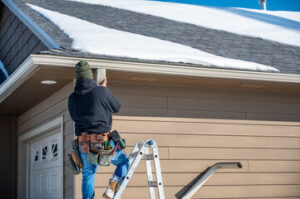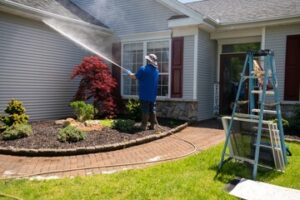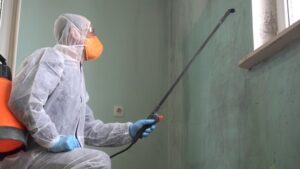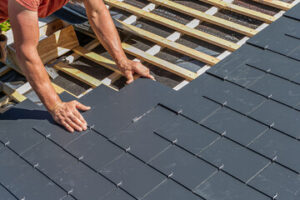A window replacement can provide a fresh look, minimize energy costs, and help avoid issues like water leaks, rotting frames, and pest infestation. However, the many options can be confusing.

Learn the lingo so you can discuss your goals with contractors and get the best windows for your home. Accurate measurements are essential for a snug fit to prevent air leaks and enhance energy efficiency. Contact Window Replacement Ellicott City, MD for professional help.
Window replacement is an excellent opportunity to upgrade your home’s energy efficiency. Old windows are a major source of heat loss in the winter and overheating in the summer, but replacing them with modern energy-efficient options can dramatically reduce this problem. This is accomplished by choosing the right window frames and glass. Double and triple-pane glass with low-E coatings and vacuum-sealed argon fills will deliver much more insulation than single-pane windows, and can make a significant difference in your utility bills.
Window Frame Material
There are several different window frame materials to choose from, with fiberglass being one of the most energy efficient. This material combines durability and strength with low maintenance costs, making it an excellent choice for new construction or replacement windows. Fiberglass also has the added benefit of being inert, meaning it will not warp or decay over time.
Other popular window frame materials include vinyl, aluminum, and wood. Vinyl is the least expensive option, but is not as energy-efficient as other options. Aluminum is stronger than vinyl, and has the advantage of being inert and rustproof. Wood provides a classic look, but it can be more difficult to maintain than other materials. However, when properly cared for, wood windows can last a lifetime and are beautiful to behold.
Window Glass
The glass in your new window will also impact its energy efficiency. A good rule of thumb is to replace any existing single-pane glass with a minimum of double-pane glass, and preferably triple pane. This will provide you with the greatest energy savings, while still providing ample light and visibility.
Installation Method
In general, replacement windows are installed from the inside of your home. This involves removing the interior trim or casing around the existing window to access the frame. The old window sash is then removed, and the new replacement window is fitted into the existing frame. The benefits of this method are that it minimizes the disruption to your home’s exterior, and can be completed at a convenient time for you. However, in some cases, particularly with full-frame replacement or certain window types, installation may need to be done from the outside.
Security
If your old windows are loose or have gaps, they can invite intruders into your home. But modern window technology and mechanisms makes them more secure, especially when they’re made of fiberglass or aluminum frames. They are also resistant to dents, rust and rot.
The type of window style you choose will have a significant impact on security as well. Picture windows, for example, do not have any moving parts and are one of the most secure window styles. Window bars can be added to these windows for additional security as they are almost impossible to leverage from the outside.
Another way to increase the security of your windows is to upgrade from single-pane glass to double or triple-pane glass. This will make your windows more difficult to break into and will reduce the risk of glass shards falling inside your home. You can even add tempered glass to your windows. Tempered glass is treated with special thermal and chemical processes that make it almost double as strong as regular glass. When it breaks, tempered glass will break into small granular pieces instead of jagged shards.
You can even improve the security of your windows by choosing ones with multi-point locking systems. These locking mechanisms are more challenging to open and require multiple steps to fully lock the window.
Lastly, it’s important to work with a licensed professional for your window replacement project. Licensed professionals are well-versed in safety regulations and will ensure that your new windows meet all applicable standards.
Preparing the space for your window replacement is an essential part of a successful project. Start by removing any furniture in the vicinity of your windows. This will provide ample space for the installation crew to work. Additionally, remove any wall decorations and family heirlooms from the area. These items may get knocked off during the window replacement process and could fall onto someone who is working nearby. You can protect these items by covering them with blankets or bubble wrap.
Durability
The longevity of your replacement windows depends on the material they are made from and how well they were installed. Choosing a high-quality brand such as Renewal by Andersen, for example, can help ensure that your windows are reliable and durable, with a long lifespan, and even offer transferable warranties to protect your investment.
The age of your window also plays a role in how long they last. Over time, older windows tend to become less energy-efficient, and can experience problems such as condensation between the panes, obstructing your view and reducing their insulation effectiveness. If you are noticing that your windows are no longer as efficient or as effective as they used to be, it may be time to replace them.
While damage to your window is the most obvious sign that it’s time for a replacement, other symptoms that should not be ignored include drafts and water seepage. These issues are not only a major inconvenience, but they can lead to higher energy costs and water damage to your home.
A new window is a major investment, so you want to make sure that it is going to last as long as possible. This can be achieved by regular cleaning, inspection of window seals and frames, and following seasonal maintenance tips. Additionally, window repair specialists can help extend the life of your current windows by fixing cracks, sealing leaks, and addressing other issues promptly.
Window replacement is a great way to improve the overall quality and appearance of your home, while adding value at the same time. It’s important to choose a professional installer, such as the team at Asher Lasting Exteriors, who can help ensure that your new replacement windows are properly installed and that they will stand up to the test of time.
Before starting the installation process, we will inspect the rough window opening for rot, damage, and moisture. Then we will apply flashing tape around the opening for weatherproofing. We will also install a backer rod, which is a foam material that fills gaps and prevents air leaks, as well as shims (if necessary) to ensure that the replacement window fits securely. Once the frame is secured, we will remove the old caulk and sealant from the rough window opening and carefully lower the replacement window into place, ensuring that it is level and plumb.
Aesthetics
Windows are a focal point in your home, and when you choose the right style and customization options, they can elevate the aesthetic of your space. From the type of frame to the design of grilles and muntins, there are many ways that new windows can transform your home’s appearance.
While aesthetics aren’t the primary reason for window replacement, they are an important consideration when making your decision. Old, outdated windows can detract from the overall look of your home and can lead to problems like water leaks and drafts. New windows can help improve your home’s curb appeal and make a positive impression on visitors.
In addition to improving functionality and boosting energy efficiency, new windows can also add a new dimension to your home’s aesthetic. New windows can be designed to complement your existing architecture and interior design, or they can be used as a starting point for a complete renovation.
One of the most popular styles for residential windows is aluminum, which offers a modern and sleek look that pairs well with many architectural designs. Fiberglass frames can also enhance the look of your home, and they are available in a variety of colors that are easily customized with stains and paints.
Another option for upgrading your home’s windows is pocket replacement, which is a less-invasive alternative to full-frame replacement. With this method, the sashes and tracks of the original windows are removed and the new window is fitted into the opening, preserving the original frame and trim. This technique is often preferred for older homes with unique or historical features that you want to preserve, as it requires less modification of the existing structure.
When you choose to replace your home’s windows, it’s important to work with a contractor that understands the proper installation process and can guarantee a smooth, low-risk project. Improper installation can result in damage to the surrounding trim and siding, warped frames, and other issues that affect both the performance of your windows and the visual appeal of your home. In addition, improper installation can result in warranty and building code violations.





